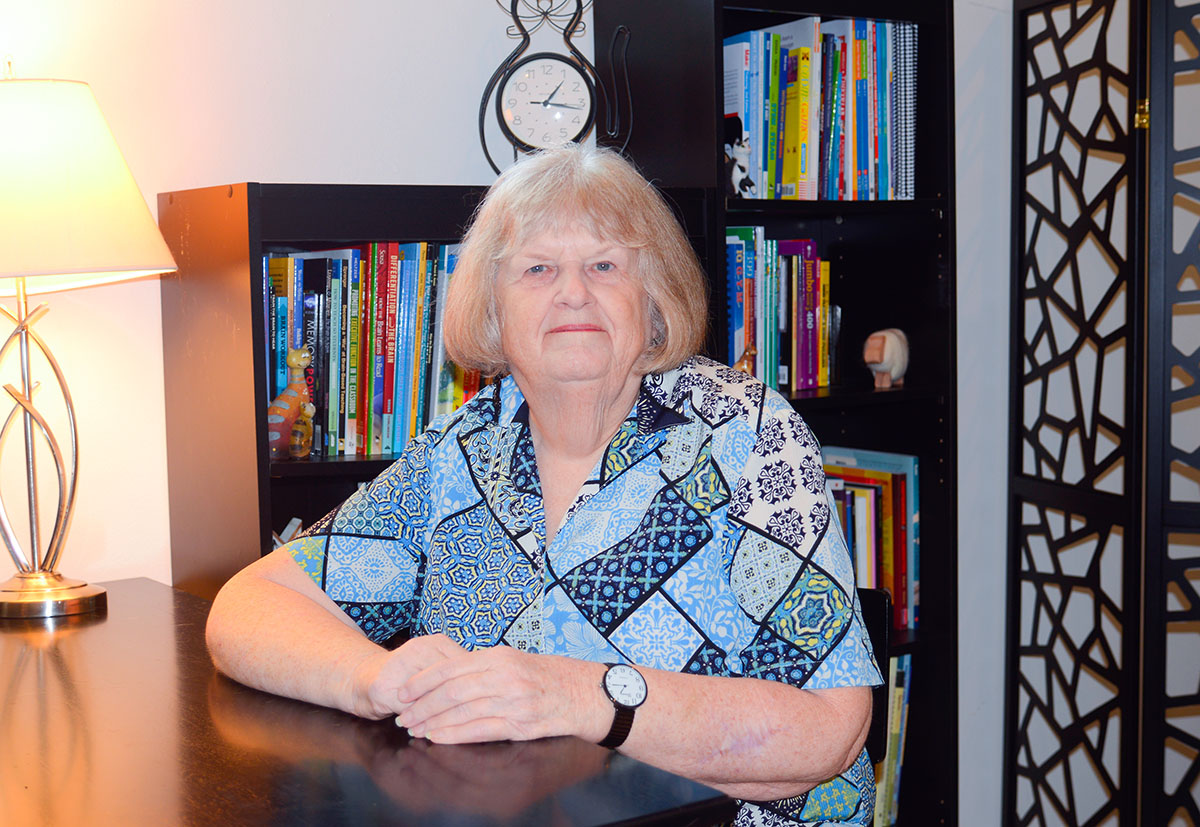THE MEMORY EXPERT

BY ELLEN GILLETTE
Liz Knowles’ home is decorated in black and white, fitting for a woman whose career included millions of black letters on thousands of white pages. Apparently the other 11 residents — cats — also approve of the color scheme.
“They let me live here,” she says with a chuckle. “I wasn’t allowed to have a pet as a child, but as soon as I had a place of my own ...”
Knowles grew up in Greenwich, Connecticut, the only child of an accountant and executive secretary. In high school, her favorite subject was boys; she sang in ensemble groups. After college, she went directly into teaching.
Her first job was teaching English to Hispanic students in a factory town. Then, teaching in New York, she met her future husband while vacationing in the Bahamas. After their marriage, they moved to the islands.
“He was a banker — offshore accounts are very big there,” Knowles says. “I was the only American teacher then at St. Andrew’s International School. The Brits never had anything good to say about the United States, but they would’ve killed for a green card.”
Knowles taught 11 years in the Bahamas, but when her husband’s bank sent him to work and train in Milan, Italy, she took a leave of absence to accompany him.
“This was 1974, so long ago that my guide was ‘Europe on Five Dollars a Day.’ I didn’t appreciate what a gift the experience was, but we certainly made good use of the time. I substituted at the international school there and we traveled every weekend on a Eurail pass.”
Excitement wasn’t limited to moss-covered ruins or quaint cafes. At that time a terrorist group, the Red Brigade, was bombing trains. “Thursdays, we’d talk about where they might bomb. ‘Do we worry or go?’ We’d always go.”
Moving to Florida in 1978, Knowles taught at several schools before launching her 29-year career at the prestigious Pine Crest School’s Fort Lauderdale and Boca Raton campuses. After returning to school herself and getting a master’s degree, then a doctorate, Knowles spent the last 15 years in administration, focusing on professional development and curriculum.
She also taught graduate education classes at Nova Southeastern and Florida Atlantic universities. Although she’s still in contact with some of her elementary students, she “loved teaching teachers how to teach, helping them with their struggles, showing them shortcuts to use.”
After leaving Pine Crest, Knowles taught at Boca Prep International School and wrote curricula for four Palm Beach County charter schools. Next, she opened a brain training franchise. “It was a bad move,” she says, but one that prompted the start of her own business. Cognitive Advantage is a combination of cognitive skills development and educational consulting.
Knowles uses her book DIY Brain Fitness to empower people of all ages.
“Kids who can’t focus aren’t able to retain knowledge or apply it,” she explains. “Reading and math suffer. I work with them on paying attention long enough to really hear what’s being said.”
Just as you can’t go to the gym three times and expect a beach body, Knowles says that cognitive training requires time and practice.
“Seniors may think they’re experiencing dementia because they don’t remember things, but everyone forgets. We don’t always focus because we do things automatically, multitasking.”
One method she advocates is saying things out loud as a task is performed.
“‘I’m locking the back door.’ When we hear it, it implants deeper into the brain,” she says.
Covering the material in five hour-long sessions, Knowles gives presentations at clubhouses, churches and schools. She also takes individual clients.
“There’s a lot of misinformation out there,” Knowles says. “People think a pill or supplement will do it, but you have to do your due diligence. You can build memory. I have proof, testimonials from people who have seen their focus improve.”
One of the ways Knowles keeps her own thinking sharp is by writing. While in education, she wrote and co-wrote 16 books, one of the most popular being Boys and Literacy: Practical Strategies for Librarians, Teachers, and Parents. Others encourage the use of picture books in middle and high schools and boosting STEAM programs through literature and language arts.
Knowles travels every chance she gets, perhaps because as a child, excursions were limited.
“After World War II, my father didn’t want to go anywhere.”
Knowles put together four booklets cataloging her trips, notes and photographs. However, another booklet had to wait until her father’s death.
“He never talked about the war, but he kept a diary I knew nothing about,” she recalls. “He helped liberate a concentration camp.”
Knowles researched, recorded and found photographs to add. She took her mother on cruises, visiting places her husband had seen during the war before she died at age 99.
Knowles participates in three book clubs.
“My mother read to me; we read together. Going to the library was a big part of my childhood. I did the same with my son.”
Whether reading for career or pleasure, Knowles places a high priority on starting young and staying with it throughout one’s life.
“If you’re well-read, you have a better vocabulary, better ideas for creative writing, more of a knowledge base, more trivia tucked away.”
That’s good advice, as clear as the words on a page.
ELIZABETH ANN KNOWLES
Age: 75
Lives in: Port St. Lucie
Occupation: Retired curriculum specialist and teacher; business owner; author
Family: One son who lives with his family in Seattle, Washington
Education: Bachelor of Arts in elementary education; master’s in reading; Ph.D. in curriculum development and systemic change
Hobbies: Reading, travel
Who inspires me: “Good leaders. I had a principal at one school who was well organized, who ‘got’ education, who was sympathetic but could also take charge.”
Something most people don’t know about me: “I lived in Milan, Italy, for a year.”
See the original article in the print publication
Sept. 18, 2022
